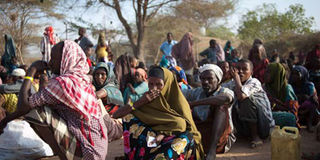President Kenyatta meets top UN officials over Kenya move to shut refugee camps

Newly arrived Somali refugees sit outside a transport centre at the Dagahaley refugee camp near Dadaab in Kenya on July 22, 2011. President Uhuru Kenyatta on Friday met members of the United Nations Security Council in Nairobi to discuss the government's plans to repatriate refugees. PHOTO | AFP
What you need to know:
- The talks with the 15 diplomats were a follow-up to UN Secretary-General Ban Ki moon’s call to President Kenyatta asking him not to shut down the Dadaab refugee camp.
Kenya has said the main reason for closing the camp and repatriating the refugees is the security risk posed to the country by Al-Shabaab radicals who have mixed with the refugees.
Other issues that had been expected to be raised in the discussions were lack of the critical components necessary for stabilising Somalia, such as robust land, air and maritime defence capabilities and assets.
President Uhuru Kenyatta on Friday met members of the United Nations Security Council in Nairobi to discuss the government's plans to repatriate refugees as well as the general situation in Somalia.
The talks with the 15 diplomats were a follow-up to UN Secretary-General Ban Ki-moon’s call to President Kenyatta asking him not to shut down the Dadaab refugee camp.
A statement from the presidential communications unit said Kenya’s decision to close the camp was discussed at length.
The team also held lengthy discussions with the President on the situation in Somalia and the work of the African Union Mission in Somalia (Amisom) in Somalia, whose troop contributing countries are Kenya, Uganda, Burundi, Djibouti, Ethiopia and Sierra Leone.
Kenya has said the main reason for closing the camp and repatriating the refugees is the security risk posed to the country by Al-Shabaab radicals who have mixed with the refugees.
TERRORISTS' BREEDING GROUND
Announcing the closure earlier this month, Interior Principal Secretary Karanja Kibicho said the camp had become a breeding ground for terrorists and that “some of the largest terrorist attacks, including the 2013 one at Westgate, have been planned and executed from Dadaab.”
Other issues that had been expected to be raised in the discussions were the lack of critical components necessary for stabilising Somalia, such as robust land, air and maritime defence capabilities and assets.
“The recent decision by the European Union to effect a 20 per cent reduction of funding to Amisom is a manifestation of this difficulty. Of equal importance is the temptation of our international partners to forget that the African Union is in Somalia on behalf of the United Nations.
“Whereas the continent is footing the bill of stabilising Somalia by blood and flesh, it is disheartening that the international community is even contemplating to reduce support to Amisom,” the statement went on to say.
After the meeting, President Kenyatta will fly back to northeastern Kenya to resume his tour of the region.





